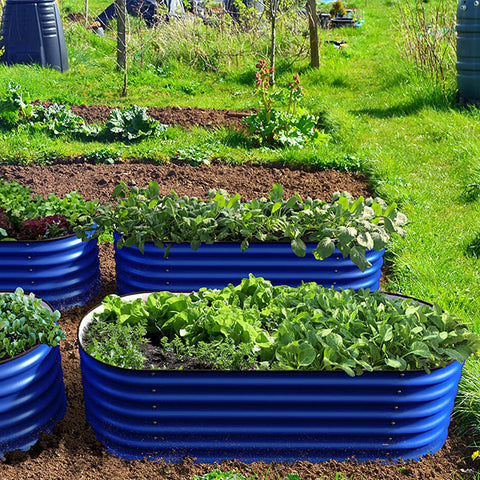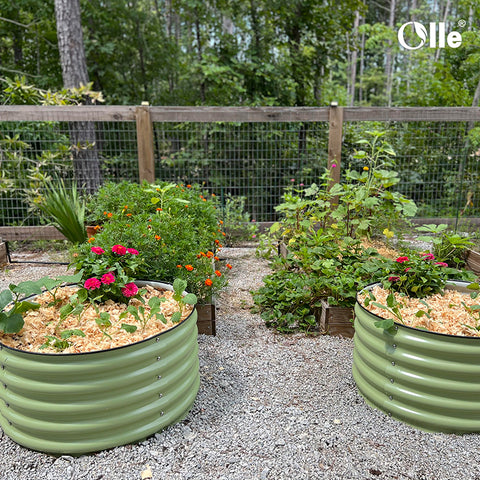Knowledge from Olle Garden Bed: Six Smart Ways To Use Orange Peel In The Garden
Citrus is rich in antioxidants, minerals and vitamins. It is a powerful fruit. Besides strengthening the immune system, it also has many uses. Once you eat the fruit, you can use the orange peel with strong smell to complete many tasks in your home and backyard, including gardening. From using the whole orange peel to brewing orange tea, to using it in compost, you can convert and use the inconspicuous orange peel in many ways. The following content also has some reference value for raised garden beds.

One of the best things you can do with old kitchen residues (including orange peel) is to add them to the compost pile. Orange peel may take more than two years to decompose. They are rich in nitrogen, potassium and phosphorus. Once decomposed, they will provide fertile soil for your garden.
However, oranges are acidic. If mixed with alkaline organic substances in unbalanced proportion, they will also make the soil quite acidic. This is very good for acidophilic crops such as blueberries, potatoes and azaleas, but may be incompatible with asparagus, beans and kale. The acidity of oranges is also not ideal for a large number of worms, because they prefer neutral ph value, so it is better to jump over oranges when earthworms compost.
Sprinkle chopped peel in the garden
Because oranges are rich in acids and important plant nutrients, such as potassium and phosphorus, you can use them to exert your advantages. Before adding soil additives, it is always a good idea to first test the soil ph and mineral level to obtain a basic reading. Then, if necessary, add the chopped or ground orange peel directly to the garden bed of acidophilous plants. The peel will act as fertilizer and lower the ph value. Your pepper, radish and azalea will fall in love with you.
Seed start-up tank
To use orange peel as a seed starter, you must first learn the art of carving oranges. Citrus and oranges tend to peel more easily from fruit, but their skins are also quite thin. Larger oranges, such as navel oranges or oranges, have thicker skins, but are often more difficult to remove the fruit. You can use any type of orange or citrus fruit as seed starter. Carefully peel off a small circle of peel and scoop out the fruit with a spoon.
Then, the seed starting mixture is filled, and seeds and water are added. Put it on the window, under the growth lamp, or turn it into a hanging basket, wait and keep it wet. Once your seedlings are ready for transplantation, you can remove the skin or plant them directly in the garden.
Stop pests
The limonene (a colorless liquid) in citrus peel oil will produce a strong odor of turpentine, which has a deterrent effect on many pests (including slugs, aphids, ants and whiteflies). In addition to resisting all kinds of unwanted garden pests, citrus is also environmentally friendly, low toxicity, and safe for your pollinator friends. Bees will not be intimidated by citrus, which means that you can use citrus peel happily in the garden without losing any garden insects that are in urgent need.
For slugs, spread orange peel on the surface of the garden. Be sure to change the peel every few days, because they will dry, and they are better as insect repellents when they are fresh.
Since citrus oil is partially soluble in water, you can also make citrus spray by boiling several cups of water and orange peel. Then, let the liquid cool, filter the orange peel, and pour it into a spray bottle. Spray the leaves of plants directly on the pests you see; Repeat every few days. For the ant hill, do not spray, but pour the liquid directly into the ant hill.
Note: Do not use orange fruit, because it may attract pests.

Stop the neighbor's cat and dog
Although cats and dogs nearby may be lovely, they occasionally cause serious damage to the garden. Cats are notorious for using gardens as litter pots. Dogs may decide to dig things to play with or carrots. In either case, pets can be pests in the garden.
The strong smell of orange is a wonderful and safe insect repellent for cats and dogs. Both quadruped friends have sensitive noses and don't like the smell, but it won't hurt them. You can add whole or ground peel to the edge of the garden, or upgrade it to a higher level, or mix coffee grounds. The mixture of the two is a strong smell that cats will definitely avoid.
Cleaning products
Citrus is also a powerful cleaning tool with antibacterial and antifungal properties. The above pest sprays are also excellent as cleaning sprays; Boil water with orange peel, filter and pour into spray bottle.
You can then use spray to clean garden tools and old flower pots after using them. This can ensure that you will not transmit diseases and pests to the next batch of plants. As an added benefit, your gardening tools will smell great.
Orange You're smart
Orange peel has many uses in families and gardens. Whether you choose to use the whole peel or brew tea, there are endless choices to choose how and where to use them. From their antifungal properties to their ability to enrich the soil and prevent pests, they are a multipurpose fruit. So the next time you eat oranges, why not try one of these clever techniques with peel to enhance your garden?
